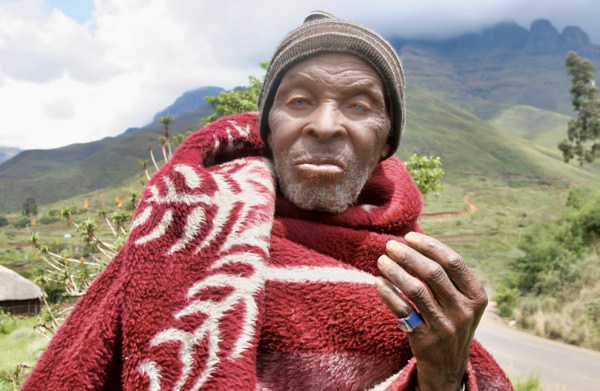Landing In The Kingdom In The Sky
By the time I stopped I had counted five or six waterfalls. Given the amount of rain I’d been through for the last two weeks, it was no wonder. But riding through this majestic valley of gently rolling fertile hills punctuated by harsh and ominous croppings of rock, the waterfalls tumbled down from cliffs more than a thousand or two meters above the simple villages dotted everywhere. The rondavel (a traditional round house) I parked near was perhaps the most primitive I’d seen. Made of branches that were tied together using a twine made of tall dried grass and reinforced by dried caked mud. I didn’t notice him at first, but as I pulled my camera and set to watch and photograph the waterfall an elderly man stood up out of the grass where he lied. Wrapped in a dark wool blanket and wearing a woolen cap he steadied himself with a simple wooden stick as he slowly moved toward me.
One of the lowland villages near the border of South Africa in Lesotho – to give you an idea of scale, notice on the top of the cliff there are cattle grazing.

Sadly I didn’t have great lighting for the shot of the valley going to the Maluti Mountains and Ketse Dam.
His eyes, a pale glassy blue were at once piercing and then warm and inviting. Introducing myself I pointed at the waterfalls tumbling from above his thatched hut and then to my heart. He started talking in some tribal dialect I later learned is called Sosotho, or South Sotho, the language of the tiny country of Lesotho. Mokhali Khanore has been living in Mphosong Ha Botso, a tiny collection of rondavels set in this beautiful valley for 105 years. Mokhali is the oldest person I’ve ever met. And he seems set on living much longer. With the help of his grand children and fellow villagers, he rebuilt his simple hut about five or six years prior. There’s no water, electricity or toilet. Scattered about the dirt track in front of the rondavel I spotted a tin can and screen which I’m sure was used for cooking.
Above: At 105 years old Mokhali still has energy and is committed to living longer. And the waterfall that drew me to stop outside his rondavel
Two young girls were the first of many to join me roadside as I gazed at the waterfall and communicated with Mokhali. The older girl with thick glasses, golden hoop earrings and a very short haircut didn’t look the part of the other villagers I’d seen. But she spoke English. She helped translate the things I wanted to express to Makhali and when I offered him a small chocolate, the old guy asked her to open the packaging which she did and then proceeded to toss the trash over her shoulder onto the ground. Before the wind took it for a sail down the beautiful valley I grabbed it and explained that she lived in a place too beautiful to just trash.
Before much time passed there were nearly two dozen children, a scattering of adults a couple dogs and a sheep or two gathered around me and Makhali. I’m pretty sure most travelers or tourists just speed there way past Mokhali’s hut on the way over the Maluti Mountains to the Katse Dam, the highest dam in Africa or Bokong Nature Reserve near the Mafika-Lisiu Pass. I didn’t have enough treats for the all the children, but I passed out some stickers and what treats I had.
I imagined at 105 years what Mokhali must have seen. The pleasure, the pain the passing of his wife and even perhaps some of his children. Though wrapped in his woolen blanket he remained close to me even as more and more children tried to get closer to this white motorcyclists who decided to gaze at some waterfalls. I’m sure his diet is simple and yet he’s lived through more than 100 harsh winters with whipping winds from the mountains and sleeting rain and snow. It is summer now and the chilling air calls for woolen blankets that most of the locals wear while wandering the valleys and tending to the crops and livestock.
I crossed the border by about 9am this morning after leaving Bethlehem a half hour earlier. Still no word from Grant & Jules. I’m sure they were waterlogged from the rains yesterday. Inquiries at the gas station in Fouriesberg near the border and the border guards turned up no evidence that they’d passed through these parts. Perhaps tired of the cold and rain they’ve moved on to Kimberly, site of the largest deep hole mine in the world. My plan was to cross through Lesotho as I make my way back to Cape Town where I’ll repack my exhaust, consider new tires and find out what is dogging my Dakar with seemingly a fuel-starved sickness on a very inconsistent basis. Perhaps the screen in the gas tank near the fuel pump periodically gets mucked and clogged. I just don’t know.

At the Lesotho border I spotted these young kids decked out in caps and gowns. Not sure what they’re graduating from, but they sure look cute.
The ride through northern Lesotho reminded me in some ways of riding through the Altiplano in Bolivia and Peru, only much more green and fertile. Rock formations reminded me of geography of Northern Arizona such as Flagstaff or even Prescott, while rivers and waterfalls painted a backdrop that certainly lived up to the image of Lesotho – a kingdom in the sky. I rode through a plateau in these mountains that sat at 5,500 feet (1700 meters) until making my way toward the Maluti Mountains passing through lowland villages, then through the home of Mokhali up to the Mafika-Lisiu Pass. Until then there had been spotty sunshine, big white clouds and just hint of the storm to come. Reaching 10,000 feet at the pass the rain started dripping and the fog rolled in. Soon I couldn’t see in front of me. The road winds and twists through these mountains. The air chilled in an instant. I knew it was time to turn around. There’s no easy way out of the mountains after reaching the dam. Any roads that might be considered have been turned to slick mud with the incessant rain for the last week.

Nearly the whole village came out to say goodbye.
I made for a slow cruise to the Capital, Masero, getting soaked by rain and beaten by hail. The crushing sound of thunder provided the soundtrack for my cruise as I was flanked by bright flashes and lightning bolts that struck a bit too close for comfort. Arriving soaked and safe in Masero it took an hour to wade my way through the wetness and the traffic until stumbling onto Lancer’s Inn. At this point I just needed a beer and a bed. Had it been drier I would’ve made my way to one of the Lodge’s in the country an hour or so from town, but most of those roads, I was warned, were flooded or muddied.
I hope tomorrow is drier.










Whoa!!! Africa!!! A new continent! Go Alan, go!
Alan – you legend!
I’ve followed your journey with interest and now that you’ve arrived on the African continent – the images and notes have particular interest to me. The recent images of Mokhali and his family bring me back to my days in Nepal and Northern Thailand. Simple people – yet so wise and always interesting. Worlds apart from the shopping malls of America!
Stay dry and safe. Your journey inspires!
These children…. They KILL me :-)….
AFRICA… Ronnie, Angie, Sal – Glad you’re enjoying the next leg. And Ronnie you’re right. Simple people, yet so wise. And far from the commercialism and china-fused product consumers of the states… ahhh. to be there. I would love to see Nepal And Northern Thailand. And yes, this reminds me of Indonesia: Sumatra, Lombok, Sulewasi, Flores etc.
magic